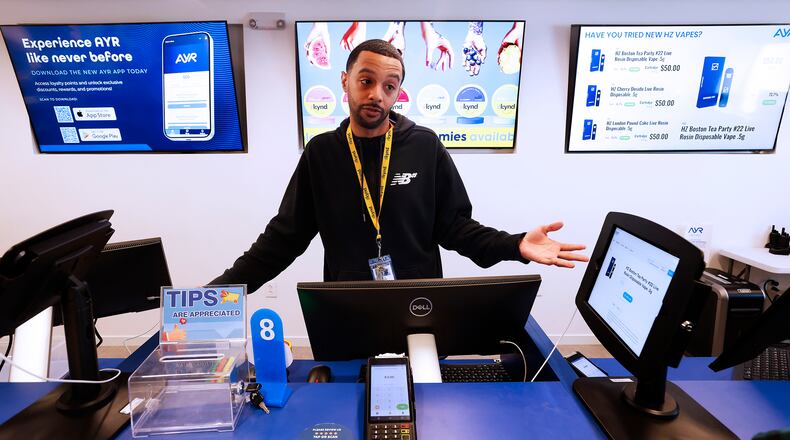One local dispensary, AYR Dispensary at 4918 Airway Road in east Dayton, allowed Dayton Daily News reporters to tour its facility. Store manager Tevin Johnson, who has helped dispensaries flip to recreational use in a few other states, said Ohio is making its own moves while also mirroring other states’ approaches to adult-use.
Checking in and browsing
Customers walking into AYR dispensary first enter into the building’s secured check-in room, where they’re greeted by a security guard and a dispensary employee.
Before making their way to the sales floor, they must present a valid government-issued photo ID to prove they’re 21 or older. Patients enrolled in the state’s medical marijuana program are also asked to present their medical cards.
This set-up matches the steps Dayton Daily News reporters took to enter Amazing Budz dispensary in Adrian, Michigan ahead of the passage of Issue 2 in Ohio. Dispensary operators there remarked that the separation of spaces was a security feature that ensured only adults were walking inside to shop and prevented theft.
Customers who are cleared to shop at AYR can move on to the sales floor. Upon entering into the sales room, AYR Dispensary shoppers are greeted by multiple employees (also called bud tenders), who are ready to help customers find a product that’s right for them.
‘Just like any other business’
Shelves lining the walls of the sales floor are stocked with colorful prop packages and containers that show off the array of flower, edibles, lotions, vapes and more at the dispensary. The packages don’t contain actual product, but allow shoppers to see offerings and read the labels. Upbeat music plays in shop speakers and rotating digital product displays appear on TV screens behind the counter.
Unlike in Michigan, there weren’t displays to separate medical products from recreational products. Products sold at AYR can appeal to both medical and recreational customers.
“We’re really just like any other business,” Johnson said. “But we’re also a lot of fun. It’s a colorful, clean space. We want people to feel comfortable and welcome.”
Two separate lines are designated for medical patients and recreational shoppers. Johnson said his and other dispensaries are keeping the needs of medical patients in mind post-legalization.
“We’re just trying to make everyone’s shopping experience easy,” he said.
State rules
Credit: JIM NOELKER
Credit: JIM NOELKER
Another commonality between Ohio and Michigan’s recreational programs: no one can use cannabis inside the dispensary walls.
Michigan dispensaries have products in display cases or behind their counters. Products they buy must be taken home or to a designated lounge for use.
But Ohio takes things a step further. State law also prohibits customers from even touching their cannabis products pre-purchase. Boxes and bags on the shelves before them are empty and simply for display.
Customers can ask to see products they’re interested in, and a bud tender will duck into the dispensary’s supply room to grab the item.
“We’ve been waiting on all of this for years, really,” Johnson. “So of course we’re going to do whatever we can to be in compliance.”
Range of prices, taxes
Prices vary by product, THC potency and quantity. A package with 2.83 grams (roughly one-tenth of an ounce) of flower, for example, could have a sale price as little as $23. The same amount of flower with a higher potency, though, could go for $40 or more.
An ounce of flower represents a “whole day unit” of cannabis under Ohio law. Bud tenders help shoppers stay within their purchase limits as they make selections.
For Dayton area shoppers, a 7% sales tax and a 10% excise tax are also added to a shoppers’ total. Michigan requires its own 10% excise tax for recreational cannabis purchases, as well as its 6% state sales tax.
About the Author





